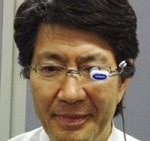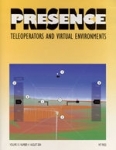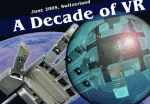May 31, 2005
Hearing colors: the Eye-borg
HMC Entertainment Systems have invented a new device called the Eye-Borg that allows people with visual impairments and even total blindness to experience the world in colour. This system has the added effect of turning them into cyborgs, or, more accurately Eye-Borgs.
The Eye-Borg project started when Adam Montandon gave a lecture on practical cyborg techniques and applications. He was approached by Neil Harbisson, a young student artist. 
Neil had a rare condition of achromatopsia (a rare hereditary vision disorder which affects 1 person in 33,000). One of the effects of achromatopsia is monochromatism, the inability to perceive colour. To him the world was black and white.
Fast Moving Energies
Neil’s only comprehension of colours were as “being an energy that I can’t see because it moves too quickly. I’ve imagined colours as fast moving energies”. Neil became curious as to the possibilities of a cyborg-like extension of his sensory system. A new input based prosthesis!
Adam built a system that would effectively hijack Neil’s other senses by allowing him to see colour through his ears. It works with a head mounted camera that reads colours directly in front of a person, and converts them in real-time, via a computer, into sound waves.
Surprisingly, within 15 minutes of Neil using the system he was able to instantly recognise similarities and differences between hues – something he had never previously been able to do.
Neil is now able to paint with a full spectrum of colors incredibly accurately, as he wears his Eye-Borg prosthesis 24 hours a day. HMC aim to develop the Eye-Borg further so that all colour-blind or partially sighted people can experience a new clarity of digital vision.
17:55 Posted in Positive Technology events | Permalink | Comments (0) | Tags: Positive Technology
May 11, 2005
Presence 2005 Conference
The 8th Annual International Workshop on Presence will be held at University College London, September 21-23.
The deadline for receipt of papers, short-papers, posters, panels, exhibition items is 6th June.
Up to 20 papers will be published in a special issue of Presence: Teleoperators and Virtual Environments (MIT Press).
See
http://www.temple.edu/ispr/conference/ for full details.
21:15 Posted in Positive Technology events | Permalink | Comments (0) | Tags: Positive Technology
Apr 12, 2005
8th Annual International Workshop on Presence
Call for Papers
PRESENCE 2005 8th Annual International Workshop on Presence
London, England September 21-23, 2005
Submission deadline: June 6, 2005
Full details on the web at http://ispr.info
OVERVIEW
Academics and practitioners with an interest in the concept of (tele)presence are invited to submit their work for presentation at PRESENCE 2005 at University College London in London, England, September 21-23, 2005.
The eighth in a series of highly successful international workshops, PRESENCE 2005 will provide an open discussion forum to share ideas regarding concepts and theories, measurement techniques, technology, and applications related to presence, the psychological state or subjective perception in which a person fails to accurately and completely acknowledge the role of technology in an experience, including the sense of 'being there' experienced by users of advanced media such as virtual reality.

The concept of presence in virtual environments has been around for at least 15 years, and the earlier idea of telepresence at least since Minsky's seminal paper in 1980. Recently there has been a burst of funded research activity in this area for the first time with the European FET Presence Research initiative. What do we really know about presence and its determinants? How can presence be successfully delivered with today's technology?
This conference invites papers that are based on empirical results from studies of presence and related issues and/or which contribute to the technology for the delivery of presence. Papers that make substantial advances in theoretical understanding of presence are also welcome. The interest is not solely in virtual environments but in mixed reality environments. Submissions will be reviewed more rigorously than in previous conferences. High quality papers are therefore sought which make substantial contributions to the field.
Approximately 20 papers will be selected for two successive special issues for the journal Presence: Teleoperators and Virtual Environments.
PRESENCE 2005 takes place in London and is hosted by University College London. The conference is organized by ISPR, the International Society for Presence Research and is supported by the European Commission's FET Presence Research Initiative through the Presencia and IST OMNIPRES projects and by University College London.
TOPICS
Submissions of papers, demonstrations, and panels that represent completed or ongoing work are encouraged in areas including but not limited to:
* Explications of the presence concept
* Presence evaluation/measurement methodologies
* Causes and consequences (effects) of presence
* Presence in shared virtual environments and online communities
* Social/affective interfaces, virtual agents, parasocial interactions
* Presence-associated technologies:
- Immersive, interactive, multimodal displays
- Advanced broadcast and cinematic displays (stereoscopic TV, HDTV, IMAX)
- Virtual environments/simulators
- 3-D sound
- Haptic/tactile displays
* Presence applications:
- Education and training
- Medicine and therapy
- Entertainment
- Communication and collaboration
- Teleoperation
- Presence and design
- Presence in art
* Presence and philosophical issues (e.g., the nature of 'reality')
* The ethics of presence
* Presence in the future: Media experiences in the 21st century and beyond
CONFERENCE FORMAT
Like the earlier workshops, PRESENCE 2005 will have an interactive format in which all participants (attendees, presenters, invited speakers) attend each of the sessions as well as several social events, allowing participants to exchange ideas and build knowledge together as the conference progresses.
The conference will feature keynote presentations by three prominent presence scholars:
Paul Verschure (Institute of Neuroinformatics, University/ETH Zürich, Zurich, Switzerland)
Woody Barfield (Human Interface Technology Lab, University of Washington, Seattle, Washington, USA)
Carolina Cruz-Neira (Virtual Reality Applications Center, Iowa State University, Ames, Iowa, USA)
VENUE
The Workshop will be hosted by University College London
(UCL) in the Bloomsbury area in the heart of the great city of London.
For more information about London visit the official website for London (http://www.visitlondon.com/); for more information about UCL, visit the UCL web site (http://www.ucl.ac.uk).
SUBMISSIONS
We invite researchers and practitioners to submit work in the following categories:
Full papers: Comprehensive descriptions of original research or design work within the scope of the workshop. Full papers are limited to 12 pages in the PRESENCE 2005 template format (see submission page at http://ispr.info) and will be considered for oral presentation (unless the submitter requests consideration only for poster presentation).
Short papers: Brief presentation of tentative or preliminary results of research or design work within the scope of the workshop. Short papers are limited to 4 pages in the PRESENCE 2005 template format and will be considered for both oral presentation and poster presentation.
Posters: Visual display presentation. Submissions are limited to 4 A4 pages which contain miniature versions of the larger pages that would be displayed at the conference.
Demonstrations/exhibitions: Step-by-step audiovisual demonstrations and/or hands-on experiences of (commercial or academic) work within the scope of the workshop. Proposals for demonstrations/exhibitions are limited to 2 pages in the PRESENCE 2005 template format.
Panels: Sets of presentations on a single theme or topic within the scope of the workshop. Submitters are encouraged to be creative regarding both the topic and format of panel proposals, which are limited to 4 pages in the PRESENCE 2005 template format.
All submitted papers will be blind peer-reviewed by at least two selected reviewers. Work accepted for presentation will be included in the official conference proceedings and may be posted on the ISPR, presence-connect, and presence- research.org web sites prior to the conference. Authors of as many as 20 of the presented papers will be invited to revise their paper for publication in one of two special conference issues (August and October 2006) of the MIT Press journal Presence:
Teleoperators and Virtual Environments.
Please submit your work online at the submission page of the conference web site at http://ispr.info by the conference deadline of June 6, 2005.
19:55 Posted in Positive Technology events | Permalink | Comments (0)
Feb 11, 2005
Congress on Virtual Reality Appications - CARVI 2005
9th and 10th of June * Vitoria-Gasteiz (Spain)
EUVE Technological Center specialised in Virtual Reality, Virtual Engineering and Hidrometeorology is pleased to announce you the 3rd edition of the International Congress in Virtual Reality Applications where the last advances in Research and Development in applied Virtual Reality will be show. Besides CARVI 2005 will be a meeting point among researchers, companies and users.
The topics of CARVI2005 will be about the Virtual Reality Applications on:
- Product design and manufacturing processes.
- Architecture, Culture and Archaeology.
- Virtual Reality in Scientific Applications.
- Television, films and advertising.
- Simulation, coaching and trainning.
- New tools, new technologies.
The deadlines for the publication of projects or research lines are:
Abstract due date: March the 8th 2005
Accetance notice: March the 16th 2005
Full paper due date: April the 26th 2005
All the information related to the Congress can be found at CARVI web site
15:36 Posted in Positive Technology events | Permalink | Comments (0)
Jan 09, 2005
Presence Research in Europe: Economic and Social
Presence Research in Europe: Economic and Social
Prospects
PREP 05
March 17 - 18, 2005
Hanover, Germany
Virtual and Augmented Reality applications diffuse into more and
more realms of business, research, and every day life. To make
people feel "present" in mediated environments is the goal of
many new technologies. But do we exploit the capacities of those
"Presence" technologies to full extent? What do the R & D
departments know that has not been adopted in applied
contexts? What do businesses and governments expect from
future VR and AR research? PREP 05 is the forum to discuss
these questions at a European level.

PREP 05 brings together leading researchers, industry
representatives and policy makers who are working on
development, applications and knowledge dissemination in the
domain of Presence. The concept of Presence is one of the
major research topics in the VR and AR communities, and the
European Commission is very actively supporting international
projects on Presence. PREP 05 is the 6th biannual gathering of
those projects, which are organized under the "Future Emerging
Technologies" Section of the Directorate General "Information
Society".
PREP 05 addresses the visions of how to use "Presence"
technologies for commercial success and the public good.
Reflecting the broad range of domains in which Presence is of
major relevance, PREP 05 will feature expert presentations on
VR-based business communication, tele-medicine, e-learning,
and entertainment. Moreover, invited speakers will introduce
European political visions on the economic and social prospects
of Presence research.
Experts from media technology corporations, e-government
projects, applied research centers, academic institutions, and
organizations who actually use VR / AR systems are invited to
join PREP 05, to share their ideas on the future of the field, and
to learn about the visions of leading experts in the field. PREP 05
will take place immediately after CeBIT, the world's leading IT
exhibition, and provides an excellent environment for networking
and exchange of ideas.
We cordially invite you to join us for PREP 2005 and contribute
your expertise and visions to the fields of VR, AR, and
"Presence" technologies.
For further information, please visit www.prep2005.info
<http://www.prep2005.info/> .
Conference Chair
Professor Peter Vorderer, Ph. D.
Annenberg School for Communication
University of Southern California
Los Angeles, USA
21:44 Posted in Positive Technology events | Permalink | Comments (0)
Jan 04, 2005
Upcoming VR-conferences
The 3rd Annual Virtual Reality, Associated Technologies and Rehabilitation Conference, University of Haifa, Israel, March 7-9, 2005, http://hw.haifa.ac.il/occupa/LIRT/
IEEE VR2005, Bonn, Germany, March 12-16, 2005, http://www.vr2005.org/view.php?nid=0
The 7th Annual Laval Virtual Reality International Conference and Exhibition, Laval, France, April 20-24, 2005, http://www.laval-virtual.org/en/index.php
CyberTherapy2005: A Decade of VR, Ramada Plaza, Basel, Switzerland, June 6-10, 2005, http://www.interactivemediainstitute.com/conference2005/
The 11th International Conference on Human-Computer Interaction, Las Vegas, Nevada, USA, July 22-27, 2005, http://www.hcii2003.gr/general/hcii2005.asp
The 4th International Workshop on Virtual Rehabilitation, Catalina Island, Los Angeles, California, September 19-21, 2005, http://www.iwvr.org/2005
14:29 Posted in Positive Technology events | Permalink | Comments (0)
MMVR13: Medicine Meets Virtual Reality
Medicine Meets Virtual Reality 2005
Long Beach, California, January 26 - 29, 2005
MMVR is the premier forum for computer scientists and physicians who develop, refine, and promote advanced, data-centered tools for clinical care and medical education. MMVR stimulates interdisciplinary networking and collaboration for improved research, validation, and commercialization.

Primary MMVR foci are medical and surgical simulation and information-guided diagnosis and therapy, along with supporting technologies: imaging, modeling, haptics, visualization, robotics, and informatics. Lectures, posters, workshops, and panels educate creators and advocates of emerging technologies.
MMVR encourages a vigorous discussion of current progress – from engineering groundwork, through assessment and validation studies, to experience with clinical and academic utilization and commercialization.
MMVR engineers, clinicians, and educators are a vanguard community of thinkers envisioning and making real the future of healthcare and medical education.
10:32 Posted in Positive Technology events | Permalink | Comments (0)
Dec 28, 2004
Invited speech about Ambient Intelligence in Haifa
We have been invited by the Center for the Study of Information Society (Haifa, Israel) to present our framework about Ambient Intelligence.
The title of our presentation is: Ambient Intelligence: Conceptual and Practical Issues
More information can be found here:
http://infosoc.haifa.ac.il/events.htm
19:00 Posted in Positive Technology events | Permalink | Comments (0)
Dec 21, 2004
International Conference Series on Disability, Virtual Reality and Associated Technologies
The purpose of the sixth International Conference on Disability, Virtual Reality and Associated Technologies is to provide a forum for international experts and researchers to present and review how advances in the general area of Virtual Reality can be used to assist people with Disability. This international conference will encompass all aspects of technology used in Virtual Reality systems. Papers are sought in which technical innovation is backed up by evidence of original and practical implementation, or which promise practical implementation in the very near future. Presentations which include video material and/or experimental systems are particularly welcome. Facilities for presenting such material will be available at the conference.
The research presented at the conference will be published in a peer reviewed Proceedings which will be made widely available. It is hoped that the conference will act as a focus for international collaboration.
ICDVRAT 2006 follows on from the success of the conference series: Maidenhead, UK (1996), Skövde, Sweden (1998); Alghero, Sardinia (2000); Veszprém, Hungary (2002); and Oxford, UK (2004). Full papers presented at all previous conferences are available here. Final abstracts from all papers accepted for ICDVRAT 2006 will be made available at the same site at the time of the conference with Full Proceedings book and CDROM archive available to delegates at the conference itself. Papers from 2006 will be made available online in Spring 2007.
13:45 Posted in Positive Technology events | Permalink | Comments (0)
Cybertherapy 2005
The rapid growth of the mental health conference has mirrored the continuous advances and discoveries made by over 400 investigators who use virtual reality and other simulation and advanced technologies to help patients with both mental and physical disorders. There have been several hundred publications over the past five years that showcase virtual reality in the assessment and treatment of anxiety disorders, eating disorders, neuro-psychiatric and neuro-psychological assessment and training, rehabilitation, adjuncts for training in the disabled population, sexual dysfunction, distraction from unpleasant or painful medical procedures, as well as a wide a variety of other fascinating ideas and new concepts.

This new conference will seek input from a wider segment of the scientific community, and is interested in attracting experts in rehabilitation, disabilities, social science, cognitive science, as well as those interested in the meeting's core topics. There is also an interest in continuing to apply cutting edge technologies such as shared virtual worlds, avatars, video game virtual reality (VGVR), augmented reality, force feedback methods, and non-invasive physiological monitoring (heart rate variability, fMRI, PET, cardiac output, ultrasound and others) in virtual worlds.
This year's theme acknowledges the increasing use of interactive media in both training and therapeutic interventions (mental health, disabilities, and rehabilitation).
http://www.e-therapy.info/
Technologies include virtual reality simulations, telehealth, videoconferencing, the Internet, robotics, and non-invasive physiological monitoring devices. By utilizing technology for training and therapy, we are able to improve existing protocols, and disseminate care to a wider segment of the population.
13:32 Posted in Positive Technology events | Permalink | Comments (0)
Advanced Signal/Image Processing Techniques for Bioinformatics Call 4 papers
EURASIP Journal on Applied Signal Processing
Special Issue on
Advanced Signal/Image Processing Techniques for Bioinformatics
Call for Papers
The success of bioinformatics in recent years has been prompted
by the advanced signal processing technologies, in particular,
estimation theory, classification, pattern recognition, information
theory, networks, imaging, image processing, coding theory, and
speech recognition. For example, Fourier analysis methods are used
to elucidate the relationship between sequence structure and function;
wavelet analysis methods have been applied in sequence comparison
and classification; and various image processing methods have been
developed to improve microarray image quality.
The development of advanced high-throughput technologies, such as
genome sequencing and whole genome expression analysis, creates new
opportunities and poses new challenges to the signal processing
community. It provides an interesting application domain for signal
processing that analyzes data for life science problems such as time
series simulation and prediction, casual modeling, and structure
prediction. It is drawing a growing interest from the signal processing
community. The goal of this special issue is to present cutting-edge
signal processing methods with applications to bioinformatics. While
such research is of interdisciplinary nature, this special issue will
focus on computational aspects of bioinformatics research.
Topics of interest include (but are not limited to):
o Tracking in fluorescent imaging
o Protein folding and protein structure analysis
o Superposition methods for protein structure comparison
o Multiple 3D protein structure alignment
o Protein structure classification
o Protein secondary structure prediction
o Microarray image analysis
o Data mining from microarrays
o Sequence analysis
o Gene and regulatory signal discovery
o Biological system pathways and networks
Authors should follow the EURASIP JASP manuscript format
described at the journal site http://asp.hindawi.com/
Prospective authors should submit an electronic copy of their
complete manuscript through the EURASIP JASP's manuscript
tracking system at journal's web site, according
to the following timetable.
Manuscript Due May 1, 2005
Acceptance Notification September 1, 2005
Final Manuscript Due December 1, 2005
Publication Date 1st Quarter, 2006
GUEST EDITORS:
Xue-wen Chen, University of Kansas, Lawrence, KS 66045-7621,
USA; xwchen@ku.edu
Sun Kim, Indiana University, Bloomington, IN 47405-7000,
USA; sunkim@bio.informatics.indiana.edu
Vladimir Pavlovic, Rutgers University, Piscataway,
NJ 08854-8019, USA; vladimir@cs.rutgers.edu
David Casasent, Carnegie Mellon University, Pittsburgh,
PA 15213-3890, USA; casasent@ece.cmu.edu
13:20 Posted in Positive Technology events | Permalink | Comments (0)






